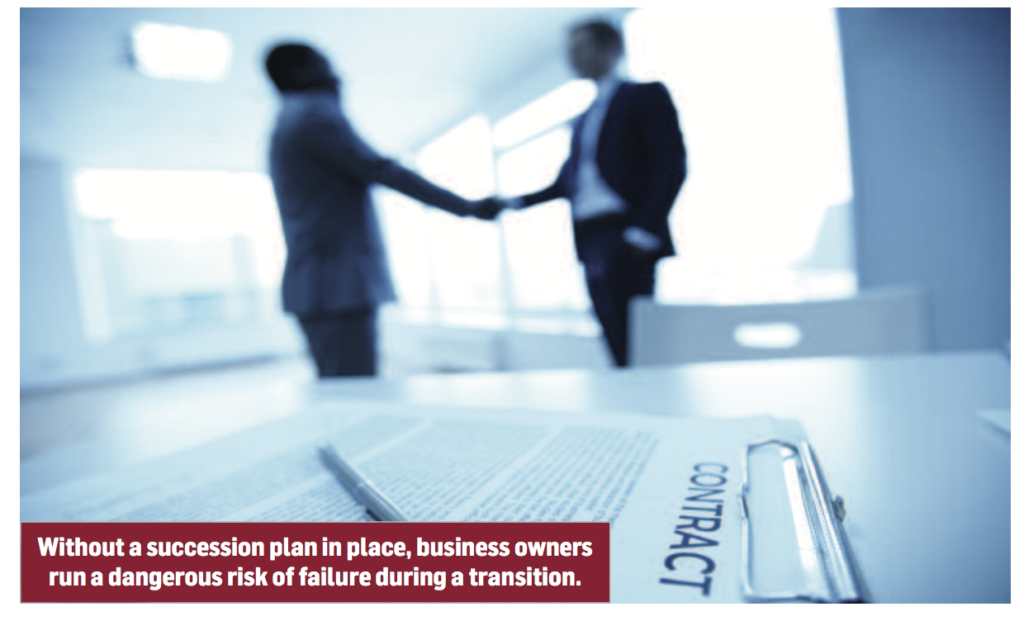January 21/28, 2019: Volume 34, Issue 17
By Leah Gross
 Succession planning is imperative if you plan to pass on or sell your business or its assets, experts in the field of ownership transitioning say. But here’s the problem: Research shows less than one-half of all businesses within the United States have an exit strategy in place.
Succession planning is imperative if you plan to pass on or sell your business or its assets, experts in the field of ownership transitioning say. But here’s the problem: Research shows less than one-half of all businesses within the United States have an exit strategy in place.
Without a succession plan, business owners run a dangerous risk of failure during a transition. Some steps to ease a difficult transition can be as simple as listening to your employees’ concerns, alleviating known issues in advance, providing positive insight to your employees about the change and helping them train and prepare for the transition.
Following is some expert guidance on the subject.
Leave nothing unresolvedWhether family members or investors, new owners of a company can easily find themselves in court facing a judge if disagreements arise and no succession plan is in place. Liens and judgements can be placed on the business that cannot be satisfied and could ultimately lead to dissolution. Proper estate planning in conjunction with a well-thought-out business transition plan can protect your assets and all the players involved. Devise a master plan
Even if you plan to have your children take over your business, you must have a transition plan in place that takes into account the timeframe necessary to bring the new owners up to speed as operators of the business and familiarize them with the customer base and other critical relationships, according to Kevin Davenport, law clerk, Basi, Basi & Associates at The Center for Financial, Legal & Tax Planning. Too often, people assume whomever is taking over the business understands it from the inside out the same way the current proprietor does. History shows that is rarely the case, as they do not have the trust and long-standing relationships the original owner has.
“I am very fortunate that my son wants to carry on our family business, which is celebrating its 50th year in 2019,” said Jan Tudor, proprietor of Tudor Carpet One Floor & Home, Valparaiso, Ind. “We have an
S Corp. as well as an LLC, and we’ve set up a 20% ownership to both. Each year, our son will receive an increased percentage as well as responsibilities of the company. I plan to stay active in the business for a long time to come, but it’s best to be prepared in advance.”
Keep contractors happyWhile Tudor is confident her son will one day take over the business, she said it’s also important to retain good sub-contractors to keep things moving smoothly. “Taking care of our talent is another important part of ensuring the company’s future stability, so we have increased their wages,” she explained. “Flooring contractors are the most underpaid trade professionals in the building industry.” Set standard procedures
Whether a dealer plans to pass his company on to a family member or sell it altogether, it pays to have an efficient operation in place. That’s according to Mike Cherico, vice president, Floors and More in Atlanta, who suggested utilizing a business strategy that relies on a “system-driven” approach vs. a people or “owner-driven” approach. “You’ve grown your company; you advertise; you have a strong customer base—even a loyal and competent right-hand person who you’ve groomed and who can execute your plan,” he explained. “When your company’s ‘face’ is the enterprise and not ‘you, the entrepreneur,’ you are poised to exit and your options are wider. You can sell a company that can operate without you deeply rooted in its day-to-day activities. A potential buyer can clearly see little or no loss in your departure because the face of the company is not tied to one person. This approach also opens up the opportunity to sell your company to your right-hand person, maybe with a payment plan that can allow their ownership to grow over time.” Expect the unexpected
Building a proper succession plan can help minimize stress when the proprietor steps down. Transitions are never easy, but by building a thoughtful exit strategy and having employees on board with the process, you can count on a smoother transition when the time comes. Additionally, forward-looking strategies are a big component of succession planning. Anticipating possible issues in advance and having a plan in place to deal with them can help ensure the continued success of your company during and after your departure. Consult with the experts
Business owners without a succession plan or exit strategy should start by exploring their options. One of the first suggested steps from Basi, Basi & Associates’ Davenport is to meet with an estate planner or business attorney to assist in the planning. One of the key components of a successful succession is to help the business continue while also getting value for the business, so aligning yourself with a professional who can walk you through the process and all of the components that need to be considered is key. Periodically review plans
Succession plans can be designed at any given time even if you have no plans to retire. Even when completed, succession plans need to be continually reviewed and evaluated due to the fluid nature of businesses. Succession plans should
be looked at as a work in progress—even the most well-thought-out plan may require modification with the passage of time.
